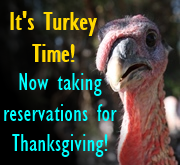Turkey Season Begins in 2018
It’s that time again—farmers have to talk turkey really early in the game because there are so many steps to raising a delicious Really-Pasture-Raised bird, and we raise a limited number each year and want to make sure you get the bird you want for your special holiday occasion. We raise turkeys for folks in the Ark-La-Tex who appreciate the quality of a truly pasture-raised bird and wish to invest in their health and a cleaner means of raising food.
Why Shady Grove Ranch Turkey?
It’s important to Know Your Farmer when it comes to meats, and specifically turkeys, because even “organic” and “pasture-raised” birds from the store may not actually be raised the way you want and expect them to be.
Why? The short story is that these terms are either very loosely defined/enforced, or don’t prohibit common industry practices such as arsenic-feeding, use of bleach and artificial flavor enhancers during processing, or even allowing the birds to actually go outside on actual live, vegetative turf (instead of a manure-laden yard at best, or no outdoor access at worst!).
Here at Shady Grove Ranch, we strive to keep our birds on living, healthy, green pasture by rotating them frequently to new grass, and we’re committed to using feed that is not genetically-modified and doesn’t contain soy, arsenic (yes, they really do that), antibiotics, or other nasty stuff. It takes more time and effort and infrastructure, but our customers agree that it sure makes for some delightful turkey that we feel good about raising and eating and feeding to our kiddos!
Is the Turkey Tasty?
Our turkeys come frozen and ready-to-thaw-and-cook and include the giblets (don’t forget to take them out before cooking!). We get great feedback on the flavor and tenderness of our turkeys. Some folks brine them. Some folks don’t. They are delicious and moist either way, but please note that our birds cook about 25% faster than conventional birds, so keep an eye on that internal temperature! Some customers use the “drumstick wiggle” method to decide if it’s done. I like to judge both the temperature and the color of the juices flowing out of the thigh.
Consider Stocking Up on Turkey
We only raise turkeys once a year, so if you’d like to cook outside the box, feel free to reserve more than one turkey! We had quite a few folks last year get 2 or 3 or as many as 11 to stock the freezer (just make sure you have a really big freezer)! They really love our turkey!
Local Turkey Delivery
Delivery to any of our routine drops in November is FREE! We will contact you closer to when the turkeys are ready to confirm your pickup location. Alternatively, you may pick up at the farm by appointment any time after turkeys are processed in mid-October.
All turkeys must be paid for in full by Thanksgiving and picked up by Christmas or the deposit is forfeited and someone else will eat your turkey! Please be diligent to communicate your pick up plans, as we have limited freezer space to store abandoned birds.
Proposed November Pickup Dates and Locations
(subject to change, but unlikely to do so)
- Tyler: Thursday, November 1
- Longview: Thursday, November 8
- Marshall: Thursday, November 8
- Shreveport: Saturday, November 3 or Saturday, November 17
- On-Farm in Jefferson by appointment Mon-Sat.
Thanksgiving day is November 22!
What’s next?
Claim your birdie with a paid $30 deposit (one per bird). And of course you’re welcome to claim as many as you like!
Why do we require a deposit? Turkeys take a lot of capital up front to raise… AND, unlike beef, pork, chicken, and eggs (which are also high-capital, ha!), turkeys are a highly seasonal item that is hard to sell after the holidays. We try to raise just enough that we have a few extras for those stragglers that find out about us just before Thanksgiving, but we prefer to spend the summer raising these special birds that we know have a spot reserved on your holiday table.
Deposits received after May 1 will lock in pricing at $5.50/lb and secure your spot on the list. Spots are limited so jump on board early!
How to Place a Deposit on Your Turkey
Hop over to our Turkey Deposits page to purchase your turkey deposit.
Important! By paying your $30 per-bird deposit, you understand that the final price is based on the actual weight of the turkey you receive, and the $30 goes toward that balance, but DOES NOT cover the purchase of the turkey in full. For example, if you sign up for a “Small” Turkey, you may receive a 15 pound turkey. The total cost at $5.50/lb is $82.50. Your deposit paid $30 of that, so the balance due upon pickup is $52.50.
Individual turkey weights can vary as much as 5 pounds or more. We do our best to harvest the birds when they are at the target weight, but there are many uncontrollable factors!
If you require a specific size, please let us know when you order and again when we contact you for pickup arrangements, and we will try to accommodate you. However, please understand that we raise a group of unsexed birds (boys grow bigger than girls), naturally, and outdoors, and we cannot control the final size distribution. We have occasionally had to adjust the size brackets slightly to adjust for variation in size outcomes. We appreciate your understanding the nature of small-scale, natural farming and look forward to serving you this holiday season!


